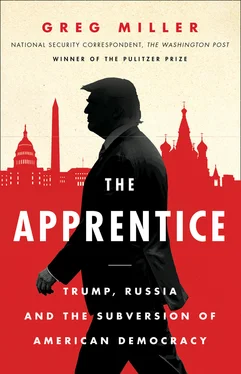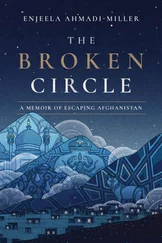Trump had from the beginning faced profound doubts about his qualifications to handle such harrowing events. Even within his own party, there was concern that his disposition and ideas—backing torture, praising Putin, criticizing European allies—were themselves threats to international stability. As Trump took a seat in the Post conference room, overlooking Franklin Square Park in downtown Washington, he had two objectives: to quiet these doubts and introduce a credible foreign policy team.
The paper’s opinion writers had been told in advance by the campaign that if asked about foreign policy advisers, Trump would make news. When the question came at the outset of the interview, Trump feigned ignorance about this bit of stagecraft.
“Well, I hadn’t thought of doing it, but if you want I can give you some of the names,” he said, turning to a piece of paper for this purpose. He proceeded to read a list that raised not a glimmer of recognition among the writers, some of whom had covered foreign policy for decades. Several participants would say later that Trump himself seemed unfamiliar with the individuals he introduced.
Of the five names that Trump listed, only one would actually end up working in his administration: retired lieutenant general Keith Kellogg, who had commanded the Army’s 82nd Airborne Division and held a senior job with the Coalition Provisional Authority in postwar Iraq, would end up chief of staff on the National Security Council. Two others had fleeting associations with the campaign and résumés that raised eyebrows: Walid Phares had ties dating to the 1980s to militant Christian groups in Lebanon and anti-Islamic views; Joseph Schmitz had resigned as inspector general at the Pentagon amid allegations of obstructing investigations of political appointees.
The final names on Trump’s list were virtual unknowns.
“Carter Page, PhD,” Trump said, glancing at his list. “George Papadopoulos, he’s an energy and oil consultant, excellent guy.”
In fact, Page was a familiar figure to only one corner of the national security establishment in Washington: the FBI agents in charge of investigating Russian espionage.
THAT TRUMP FELT COMPELLED TO PRESENT THIS ROSTER WAS A reflection of the pressure brought by his surging candidacy but also the extraordinary isolation of his campaign. By March, Trump could no longer be dismissed as a long shot or a joke. He had stockpiled delegates with convincing victories in a string of primaries, and vanquished all but two opponents in the Republican field: U.S. senators Marco Rubio of Florida and Ted Cruz of Texas.
Both senators seemed incredulous to find themselves losing to a reality television star. “I will do whatever it takes, I will campaign as hard as it takes, I will stay in this race as long as it takes,” Rubio told a crowd of seven thousand supporters in Atlanta on February 27, 2016. “A con artist will never get control of this party.” Two weeks later, after Trump claimed a massive haul of delegates on Super Tuesday and captured Rubio’s home state of Florida, the chastened senator was done. Cruz soon bowed in defeat as well.
Yet many in Washington were not so ready to acquiesce. Candidates with momentum like Trump’s ordinarily exert a gravitational pull on the powerful in their parties, attracting donors and would-be advisers eager to position themselves for influence with, or jobs in, a new administration. With Trump, however, the inverse was happening: the closer he got to securing the nomination, the more determined many of the most experienced and respected policymakers affiliated with his party were to reject him.
On March 2, as the dust from Super Tuesday was still settling, a collection of 122 self-described GOP national security leaders published a letter online vowing “to prevent the election of someone so utterly unfitted to the office.” The missive was signed by a roster of Republican loyalists, some of whom had held senior positions in government, others regarded as influential advisers and columnists. The petition was drafted by Eliot Cohen, who had served as counselor to Secretary of State Condoleezza Rice in the George W. Bush administration. Other signatories included Michael Chertoff, former head of Homeland Security, and Dov Zakheim, who had held senior positions at the Pentagon.
The letter excoriated Trump, saying that his views were so “unmoored” that he veered from “isolationism to military adventurism within the space of one sentence.” His support for resuming the use of torture on terror suspects was “inexcusable,” and his “hateful, anti-Muslim rhetoric” needlessly inflamed tensions across the world. The letter noted that his “admiration for foreign dictators such as Vladimir Putin is unacceptable for the leader of the world’s greatest democracy.” It concluded with a stab at his supposed business acumen. “Not all lethal conflicts can be resolved as a real estate deal might,” the letter said. “There is no recourse to bankruptcy court in international affairs.”
The next day, Mitt Romney, the 2012 Republican nominee, gave a scathing speech opposing Trump’s candidacy, declaring that his foreign policy was “alarming allies and fueling the enmity of our enemies.” Trump, Romney said, was a “phony, a fraud,” a candidate “playing the American people for suckers.” Two weeks later, party insiders gathered at the Army and Navy Club in downtown Washington to devise plans to block Trump’s nomination and potentially launch a third-party bid. The “never Trump” movement would intensify in the coming months, ultimately to no avail.
Trump’s decision to announce his team of foreign policy advisers on March 21 at the Post was meant to arrest the intraparty revolt. But the anonymity of those included on his roster only reinforced the impression of a campaign bereft of experience or expertise. The résumés of Page and Papadopoulos were laughably thin.
Public records showed that Papadopoulos had graduated from DePaul University in Chicago in 2009, lived in London for a stretch, and then worked as a research assistant for the Hudson Institute, a conservative think tank in Washington. His few writings, including several op-eds for Israeli news sites, focused on Greece, Cyprus, and Israeli natural gas holdings in the eastern Mediterranean. On his personal LinkedIn page, he highlighted his role as a representative to the 2012 Geneva International Model United Nations, a mock exercise in global diplomacy for high school and college students. It was the sort of credential one might include on an application for an internship, not present as a qualification to advise a potential president. (The UN claim may also have been dishonest—others at the Geneva event that year have no record or recollection of him attending.)
Page had more seemingly legitimate experience. A 1993 U.S. Naval Academy graduate, he had worked at Merrill Lynch before starting his own company, Global Energy Capital, in Manhattan. He claimed affiliations with respected think tanks including the Council on Foreign Relations, a New York–based organization that counted a dozen former secretaries of state among its members.
Hidden at the time, apparently even to Trump, were more disconcerting aspects of his background. Just days before the candidate’s meeting with the Post ’s editorial board, Page had been questioned by the FBI—not for the first time—about his ties to Russian intelligence. In fact, by that point the bureau had been tracking Page, intermittently, for at least three years in connection with an FBI probe of a Russian spy ring in New York.
Page was aware of the bureau’s interest. Back in June 2013, he had met with FBI agents at New York’s Plaza hotel (once owned by Donald Trump until indebtedness forced him to sell), insisting that his contacts with Russians were related to “my research on international political economy” and that any documents he had provided related to the energy business. He made it clear that he was doing the FBI a favor by assisting them voluntarily because, he said helpfully, “it seemed to me that the resources of the U.S. government might be better allocated toward addressing real national security threats, particularly given the recent Boston Marathon bombing.”
Читать дальше












